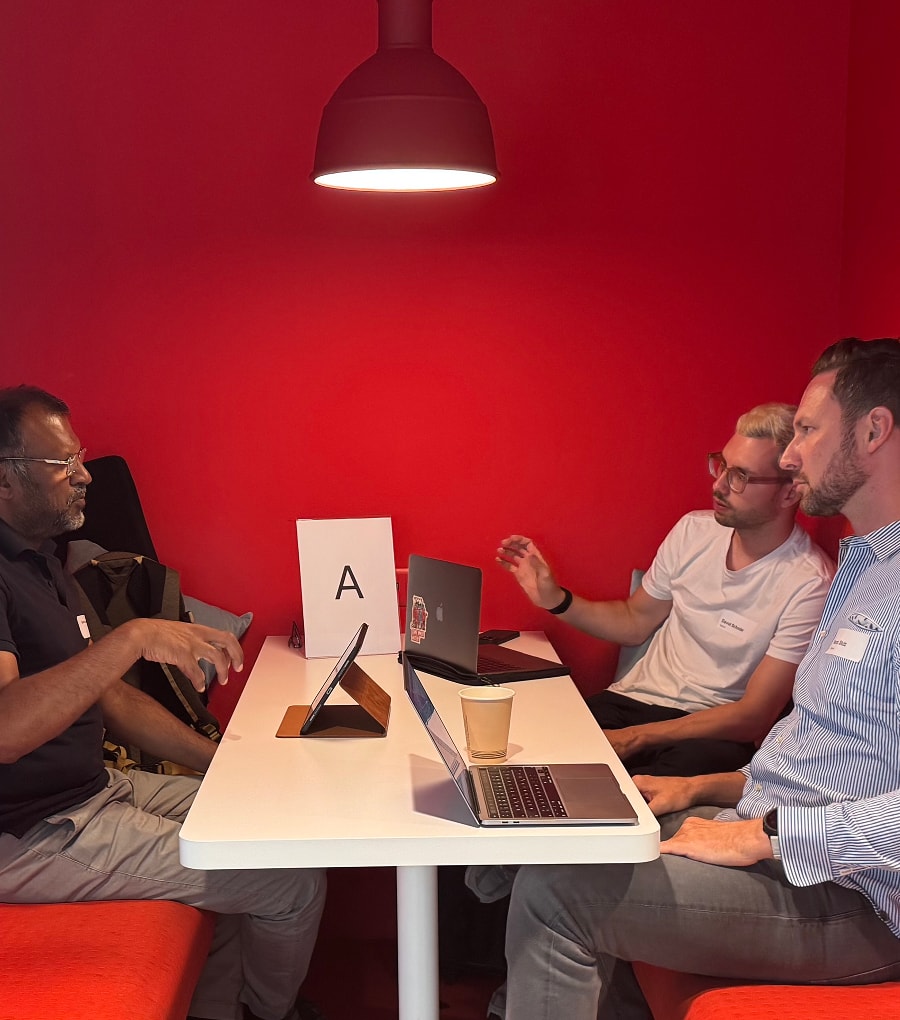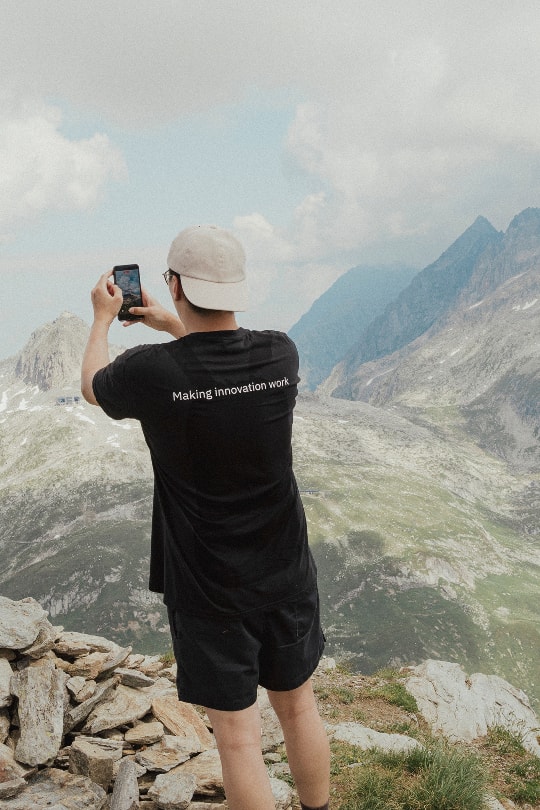Learn to scout and work with early-stage startups, build a thesis, source deal flow, evaluate teams, and launch pilots. With Tenity’s tested framework, corporates and startups can collaborate seamlessly and drive meaningful innovation.
Quick Take:
Learn how to scout and engage with early‑stage startups – from building a thesis and sourcing deal flow to vetting teams and launching pilots. Tenity’s proven framework helps corporates and startups collaborate effectively and drive innovation programs with impact.
As a corporate, you might be doing startup scouting (also called dealflow sourcing) for three main reasons:
- To learn and get deeper insights on the current startup market.
- To find startups to collaborate or partner with.
- To find startups to invest in or acquire.
There are a lot of different ways corporates can do startup scouting, but many are not as effective as they could be. That’s why in this article I’ll be going through:
The main ways corporates do startup scouting (and their downsides)
Via inbound requests
In my experience, many corporates’ dealflow sourcing strategy is to rely on inbound requests from startups that want to collaborate.
In theory, this may sound like a great position to be in: people are coming to you and you don’t have to spend resources on scouting activities! But there are a few drawbacks:
You’ll still have to do research
Just because a promising startup has reached out to you, does not mean they’re the right startup to work with.
When they first reach out, it’s likely your first question will be “Who are their competitors and are they better?” And in order to answer those questions, you’ll have to do research on the market. You’ll have to reach out to competitors, set up calls with them and do your due diligence. In the worst case, these competitors might not be open to having a discussion.
You end up in the same situation: still having to do your own research.
It could jeopardise existing relationships
You’ll often find that a lot of the inbound requests are via existing relationships within your company. For example, your colleague might have a friend who runs a startup and is looking to work with a corporate.
This puts you in a difficult position. Rejecting the startup could affect relationships internally, but working with the startup that’s not a right fit could also lead to wasted resources and jeopardise your own position.
It could affect your reputation as a company
If you agree to take meetings with the startups who reach out to you but then don’t take action, this could also affect your reputation as a company in the startup world. A lot of startups talk to each other, so you don’t want your company to be known for not taking action.
Because of these three main drawbacks, I believe relying only on inbound requests is an inefficient way to get the most from startup scouting. Any work that comes off the back of an inbound lead is likely to be a bit of a stab in the dark.
Via an internal team that also does scouting
Another approach that some corporates take is to build their own dealflow sourcing team. In this case, you have an internal team tasked with identifying, connecting and working with startups. In addition to online research, this team will also attend events and conferences to scout and generate startup leads.
Although the key benefit of having an internal team is that they will know the corporate innovation strategy inside out, there are still drawbacks:
- If you rely mostly on events for startup scouting, you’ll quickly discover that there’s a lot of competition for growth stage startups as there’ll be a high demand to invest in them.
- You’ll still need to build up the skills and knowledge internally to understand the critical success factors to picking the right startup.
- The team will often have to divide their attention between identifying startups, going through selection and then executing the collaborations.
Although an internal team can do a good job at startup scouting, it might not always be a good use of resources. It’s best to not take time away from internal stakeholders, and let them focus on what they do best.
Via a startup scouting platform
Another way to start researching relevant startups is to join a database with thousands of listed startups. As a user, you can filter with your criteria and then get a list of startups which is in line with what you want.
However, there are also drawbacks:
Databases are more like marketplaces, so information is self-reported
When a startup is added to the database, what is the due diligence done from the database’s side? In other words, is the process selective enough?
The issue is that a lot of the information you’ll find about the startup on the platform will be self selected. You’ll find a lot of positive information, but that can make it hard to get the full picture. You’ll also find that a lot of the information you can find in these databases is already public information – and yet you’re still having to pay a fee.
You’ll likely need more context to be able to make a decision
The databases do a good job of offering an overview of a startup. But to make a decision you’ll need a lot more context. You need expert information so you can get context of what’s happening in the field and validate the startups credentials. In other words, you need an expert who can tell if the startup really is what they say they are.
Ideally, this comes from someone who has experience in the startup world and has the skills and expertise to gather the right information. Often, this requires looking for information that can’t be found on these platforms.
There’s no engagement process to enable collaboration
From the platforms that I’ve seen, very few will put together a proper process to help connect you with startups and engage with them once you’ve expressed interest in one.
That means that you’ll still have to do most of the work: reaching out to the startup, doing additional research, looking at competitors and driving the conversation forward.
Because of all these drawbacks, I personally haven’t seen a startup matching platform that works well – on its own – for corporates.
How we do startup scouting at Tenity
We’ve been scouting startups for large corporates since we first set up Tenity as a spin-off from SIX (the Swiss stock exchange) in 2015. Since then, we’ve facilitated over 60 collaborations between startups and corporates. Here’s what you get when you work with us:
You’ll get support with developing your startup thesis
One of the most common mistakes I see corporates make is not spending the time developing a thesis before getting started with startup scouting. In my experience, corporates have too narrow a view of what they want. But for startups scouting to be successful, you need to be open to innovative ideas.
That’s why when we first start working with a corporate, we begin by putting together a thesis that is open enough that it can actually be delivered.
We’ll help you define what type of startups you’re looking for by asking questions like:
- Are you looking for a company that’s very early and potentially experimental?
- Or do you want a startup that is well established, and is ready to deploy your product or partner?
- If you’re focused on a vertical, what kind of specific problem are you looking to solve?
Based on these discussions, we’ll help you develop a thesis and then document it.
You won’t have to start from scratch
We operate as an open innovation startup ecosystem, with over 2,000 fintech and insurtech startups in our database. We’re constantly running new startup accelerator programs, hosting events and talking to startups, so never have to “start from scratch” since we’re doing this already on a daily basis.
Here are a few ways we get startups and entrepreneurs into our ecosystem.
- We have local scouts on the ground in exciting innovation hubs like Singapore.
- We run startup events and attend conferences (and make sure we don’t miss out on any new ones).
- We have a global scouting team who create and run campaigns.
- We run our own incubation program for startups and set up application processes to generate inbound requests
- We continuously fill our own database with potential startups.
We won’t just send you an email with a list of startups, we can go a lot further than that. When we match a corporate with a startup, we perform an evaluation and check that the startup properly matches your thesis. If it is an inbound lead – in other words, the startup expresses interest – we make sure they’re not a false positive.
We conduct our own due diligence and many of the people on our team do this full-time, meaning they’ve cultivated their own gut instinct and the art of finding the right startups.
If we don’t find startups that are already in our ecosystem, we have a wide range of tactics and tools to reach other startups. Those include scouting campaigns to one-on-one outreach – we’ve done it all.
You’ll have access to vetted deal flow
Because of our open innovation ecosystem we have a big network of early-stage startup investors, corporate partners and mentors. From our various ecosystem players we get many referrals and we can stay on top of industry trends. This is what we call ‘vetted’ deal flow:
- These ecosystem players are experts and know the field well.
- They often act as the base feed for the scouting process before we perform more checks.
- They regularly send through referrals.
You’ll have support at the engagement stage
Once we’ve helped make that match, the real work begins. A successful engagement doesn’t stop at introductions; it’s about creating the conditions for a productive collaboration.
At Tenity, we support both sides through a structured engagement process to increase the chances of a long-term fit:
- Pre-pilot alignment: We help scope potential collaborations by aligning expectations, identifying internal champions on the corporate side, and clarifying what success looks like.
- Pilot setup: We support the creation of a lightweight, time-boxed PoC or pilot project that lets both sides explore value in a low-risk, outcome-driven way.
- Ongoing support: From procurement to legal, we help startups navigate internal processes and keep the engagement moving.
- Post-pilot review: We bring both sides together to evaluate results, capture learnings, and define potential next steps, whether that’s scaling, co-developing, or investing.
Just like in dating, it’s not just about the first meeting — it’s about making the relationship work. And because our model benefits when both sides succeed, we’re incentivised to make that relationship last.
Why is working with a specialist scouting startup provider an option worth considering?
The main reason it makes more sense to work with a specialist scouting startup provider is that you’re working with true experts. People who do this all day. These are experts who have seen hundreds of startups work with corporates and have cultivated almost a gut instinct for corporate and startup partnerships.
With a lot of the scouting process, you won’t always have clear data to look at. That’s when it helps to have an expert who has a good feel and understanding of the market.
You need someone who knows the critical success factors for startups, including the “soft factor”. Someone who can assess:
- The startup team (e.g. background checks, level of education).
- The results (whether this team delivered in the past).
- The business model and competitive advantage.
- Whether they could work well with a corporation.
Numbers and data aren’t always enough. For example, many tech startups will be pre-revenue, which means you need someone who can look at different metrics other than revenue. You also need someone who can sort through the false positives.
The startup scouting process is often more of an art than a science. The more time you spend looking at the best startups, the more you understand the space. And you want the people who know that to be scouting for you
Examples of successful startup scouting: Julius Baer and Vestr
In 2018, vestr joined our fintech startup incubation program. At the time, Julius Baer was looking for a way to digitise Actively Managed Certificates (AMCs). We scouted vestr because we knew private banks were looking for ways to digitise AMCs, and we thought that a partnership with Julius Baer would work well.
Vestr was ready for the engagement once they graduated from the program, and the two companies worked together to build the first PoC (Proof of Concept). Julius Baer brought in deep financial and market expertise, and vestr brought the tech team.
Fast forward to 2023, and the two companies are still working together. Vestr currently:
- Has over 1,000 professional asset managers as users.
- Raised CHF 10mn in financing.
- Has entered the American and African market.
- Has a trading volume of over USD 1 billion.
- Have a 40+ international team including ex-employees from Google, Avaloq, Accenture and ETH.
If you want to do startup scouting efficiently, then I believe the best way is to work with a specialist startup scouting team. That means: make sure to work with experts who do this full time and can support you from the initial thesis all the way to the actual engagement. With that approach, you’re a lot more likely to find the right startup to partner with.
Recommended resources
To go from scouting to engagement, ensure you are actively building a venture mindset in your organisation.


















